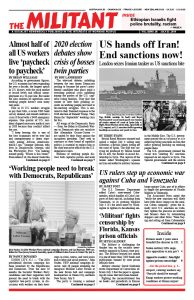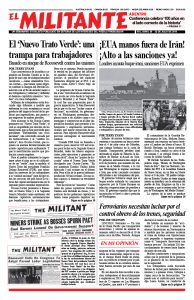The military rulers in Sudan agreed July 5 to form a joint military-civilian government set to last three years and three months with opposition leaders who’ve been mounting mass protests for weeks. After this “transition” to civilian rule, the agreement says, elections will be held and the military will return to its barracks.
Under the agreement, brokered by the African Union and Ethiopian rulers, with help from the rulers in Egypt, Saudi Arabia and the United Arab Emirates, a military general will head the transitional government for 21 months, then a civilian leader for the final 18 months. Five seats will be held by the military, five by representatives chosen by the opposition Forces for Freedom and Change umbrella group, and an 11th by another civilian agreed upon by both sides.
Workers, professionals and youth have taken part in huge protests for months in Sudan, backed by solidarity actions around the world demanding an end to military rule. The mobilizations led to the ouster of the hated regime of President Omar al-Bashir in April. Bashir came to power in a coup 30 years ago.
While there remains widespread distrust of the military, many workers and youth are hopeful the agreement can work. “The people remain on standby; the revolution is still alive, and it is not over until we get a full civilian government,” Amir Bashir, president of the Sudanese Association in New Zealand, told Annalucia Vermunt, Communist League candidate for mayor of Auckland, July 6.
“We still want the people who murdered peaceful protesters to be brought to justice,” he added. “We have no illusion in the Transitional Military Council — it is on us to keep them honest.”
As in Tunisia, Egypt and other countries where “Arab Spring” protests brought down hated governments, there is no tested revolutionary working-class leadership in Sudan.
Months of protests and solidarity
After Bashir was ousted the protests continued, demanding the military, which seized power, step aside. Army troops, joined by the paramilitary Rapid Support Forces, moved to attack encampments of thousands of protesters outside army headquarters in the capital city of Khartoum June 3. Over several days 140 people were reportedly massacred, with many more shot, raped and beaten.
Thousands of heavily armed troops still occupy the streets of Khartoum. Rapid Support Forces patrol the area in trucks with mounted machine guns and bundles of rocket-propelled grenades.
In the wake of the June 3 attack, hundreds of thousands took to the streets again June 30, demanding a civilian government.
Demonstrations took place all over the world. Over 100 people rallied June 30 in Auckland, in a protest called to “Stand with Sudan.” In Albany, New York, a group of high school and college students organized a solidarity demonstration June 28 that drew more than 250 people, overwhelmingly Sudanese.
“I’m so proud and inspired by the protesters in Sudan and their strength and courage to stand in the face of their oppressor and demand their freedom despite all the injustices they face,” Esra, a Sudanese student who helped organize the Albany action, told the Militant.
“I want to say, “Shame!” to the major powers in the U.N. like the U.S., Russia, China, Britain and France,” protester Abdalkhadir Ahmat told the rally. “They only follow their own interests.”
Alex Huinil spoke for the Socialist Workers campaign. “We call for the United Nations and all foreign powers to get out of Sudan. The United States, England — which colonized Sudan — and other imperialist powers only act in the interests of the capitalist class in their own countries,” he said to an enthusiastic response.
“It is the Sudanese people who are fighting for their rights,” he said. “We can help by building a powerful revolutionary working-class movement in the United States.”
At the protest Huinil’s co-worker, Susan Mohamed, said, “Our kids die in the war in Yemen. We don’t agree with this government that sends them to this war. We have been fighting for seven months now but we will keep our spirit. That is why my daughter and I came to the rally.”
Paramilitaries from war in Darfur
Ever present in the minds of the toilers is the genocide carried out by the Sudanese government in Darfur. The paramilitary force there, then known as the Janjaweed, was led by Gen. Mohamed Hamdan. Today he is second in command in the Transitional Military Council and runs the Rapid Support Forces.
The government tried to divide and weaken the protesters by stirring up national and religions antagonisms among them. But it failed. Protesters stuck together, chanting, “We are all Darfuris.”
Today’s protesters are determined to unite Sudanese — Arabic or English speaking, Muslim or Christian or tribal religions — across all nationalities.
Kathie Fitzgerald from Albany, New York, contributed to this article.

